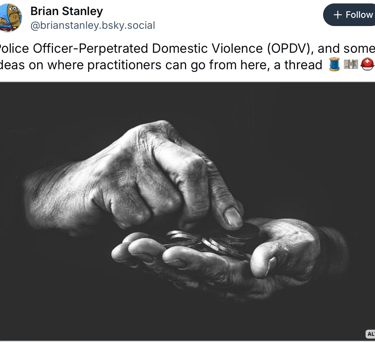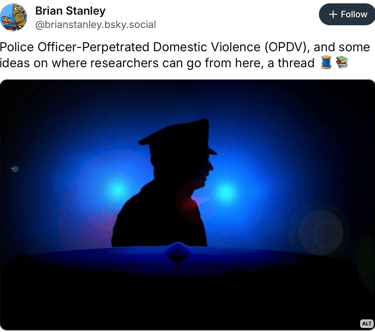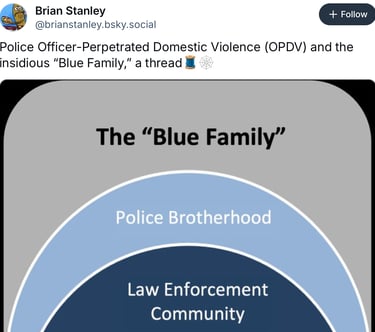OPDV Resources
This section offers a list of OPDV-related resources, intended for researchers and those looking for more information on the subject. If you need to leave this page quickly, select the orange "Exit Page" button found in the top right-hand portion of the screen, or in the drop down menu (on mobile devices). Note that internet usage can be monitored and is impossible to erase completely. For more information on internet security, see this page from the National Domestic Violence Hotline
Resources / Citations
Leaving Brame Behind: An Urgent Call to Shift the Focus of Police Officer-Perpetrated Domestic Violence Research
ResearchGate - https://bit.ly/41pSEve
Sage VAW: https://bit.ly/4fuaUJQ
National Domestic Violence Hotline Underfunding / Calls go Unanswered - https://bit.ly/4fYHlyK
OPDV Power and Control Wheel - https://bit.ly/4jfmLwJ
The Henry A. Wallace Police Crime Database - https://bit.ly/3DTs1Gk
The Network / La Red - https://bit.ly/4gMG3rx
Abuse of Power (Diane Wetendorf Website) - AbuseOfPower.Info / Dwetendorf.com
Bibliography of OPDV-related research - https://bit.ly/47nItJO
OPDV vs OIDV
Language Matters: A note on the importance of language around police officer-perpetrated domestic violence
OPDV survivor experience is obscured at every level of analysis, all the way down to the dominant language used to describe it. The most common term for OPDV is "officer-involved domestic violence (OIDV)." This term obfuscates the officer-abuser’s role in perpetrating violence, introducing ambiguity with the wording “involved with” rather than “perpetrated.” Similarly, this language deters scrutiny of the unique power and authority officer-abusers wield compared to other abusers. Other instances of violence perpetrated by state agents (Agbiboa, 2022; Atencio, 2021), along with other occurrences of male domination (Crawford & Popp, 2003; Farvid et al., 2016; Jackson & Cram, 2003), employ similar rhetoric to blur the harms of systemic violence. To make meaningful progress on OPDV, researchers will need to clarify their focus and learn from scholars deploying a GBV lens across disciplines.*
* pulled from"Leaving Brame Behind..."








